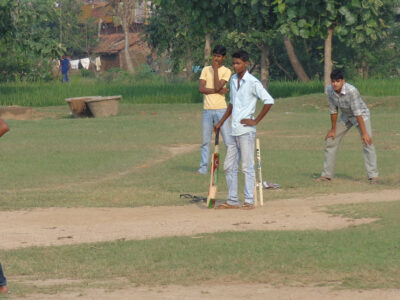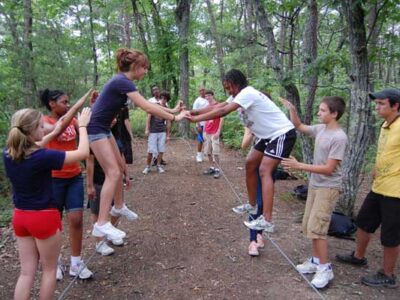Project Info
Project Description
Our youth crime projects provide evidence-based research on the different types of youth crimes, their prevalence, and the impact they have on individuals, families, and communities.
Youth crime can range from minor offenses, such as vandalism or theft, to more serious offenses like drug trafficking or violent crimes. Addressing youth crime requires a multifaceted approach that involves prevention, intervention, and rehabilitation efforts. It is important to understand the root causes of youth crime in order to develop effective strategies for prevention and intervention.
Through our research, we aim to inform policies and interventions that promote the prevention and reduction of youth crime and ultimately contribute to building safer and more resilient communities.
The effects of Sports and Physical activity interventions for at- risk and offending children and young people on behavioral, psychosocial and offending outcomes: A mixed- methods systematic review and meta-analysis.
Funder: Youth Endowment Fund (YEF)

©British High Commission
Background
Sports participation can positively impact youth development by promoting self-esteem, pro-social behavior, and social connections. The addition of Sports+ components can improve life skills, academic achievement, and access to services.
This review assesses the effectiveness of sports interventions in developing a child’s personal, social, and psychological assets, with the goal of reducing negative outcomes like offending, anti-social behavior, or violence.
What we found
This review evaluates sports and physical interventions for at-risk youth aged 25 years or below. There is currently no systematic review or published meta-analysis on the effectiveness of sports interventions for this population, creating a gap in the literature. The review will include effectiveness studies, process evaluations, qualitative studies, and cost-effectiveness studies to provide a comprehensive analysis of the impact and implementation of sports interventions.
This is an ongoing review
Lead Author: Suchi Kapoor
The effects of adult mentoring interventions for at-risk and offending children and young people on behavioural, psychosocial, and offending outcomes: A mixed-methods systematic review and meta-analysis
Funder: Youth Endowment Fund (YEF)

© Brian Ujiie
Background
Youth involvement in anti-social behavior, violence, and criminal activity has become a major concern in recent times, particularly due to an increase in serious violent incidents.
Mentoring programs can play a crucial role in addressing these issues by providing youth with a positive adult role model who can build a healthy relationship with them, offer guidance, and engage them in positive activities. Such mentoring relationships can create a supportive environment for desired changes in behavior and attitudes among at-risk youth.
Approach
This review examines the effectiveness and implementation of adult mentoring interventions aimed at reducing violent, antisocial, or criminal behavior in children who are either displaying these behaviors or are at risk of doing so.
Specifically, the review focuses on mentoring programs that target youth offenders or at-risk children who are 18 years old or younger. The review uses mixed-methods to assess the evidence on both the effectiveness and implementation of such interventions.
What we found
- Mentoring interventions for at-risk youth may reduce crime and violence and improve outcomes such as academic and physical health.
- Most studies suggest a net saving to society.
- Qualitative findings highlight barriers such as limited availability of mentors, recruitment challenges, and issues of trust and confidentiality.
Read protocol
Lead Author: Monisha Lakshminarayanan
The effectiveness of wilderness and adventure therapy programmes in reducing anti-social and offending behaviour in children and young people at risk of offending: a mixed methods systematic review
Funder: Youth Endowment Fund (YEF)

Background
The aim of this mixed-methods review was to assess the effectiveness and implementation of wilderness and adventure therapy interventions for children and young people who are at risk of displaying violence, anti-social, or criminal behavior.
The review includes a range of interventions that focus on wilderness and adventure learning, with the goal of helping young people to develop pro-social attitudes and overcome behavioral challenges.
Approach
The review incorporates effectiveness studies, including both experimental and non-experimental studies that include a comparison group, as well as process evaluations and cost-effectiveness studies. By examining a range of evidence types, the review aims to provide a comprehensive evaluation of the impact of wilderness and adventure interventions on at-risk children and young people.
The review focuses on children and young people aged 25 years or below who are offenders or at-risk of offending, aiming to identify effective interventions that can help young people adapt to social norms and develop the skills they need to lead healthy, productive lives.
What we found
- Wilderness and adventure programmes offer potential benefits for adolescents with behavioural challenges or disorders who are at risk of anti-social and offending behaviour.
- These programmes can help develop pro-social attitudes through teamwork and create safe spaces.
- They also provide a therapeutic effect by exposing participants to nature.
- The challenge element of these programs can foster learning and self-worth among participants.
Read protocol
Lead Author: Ashima Mohan

